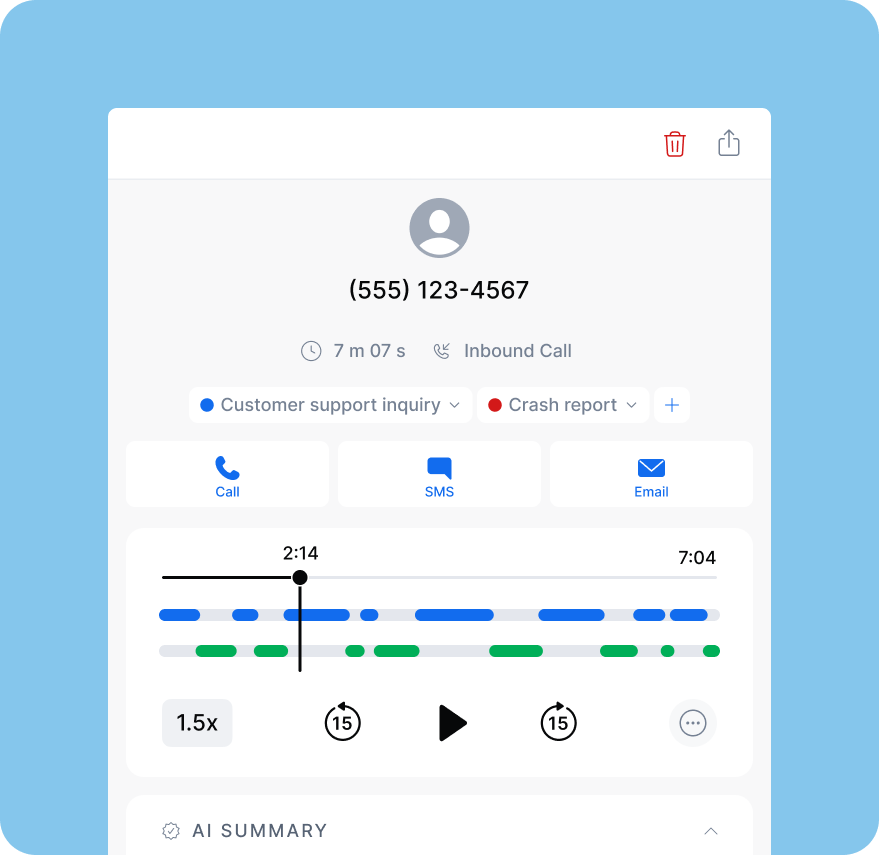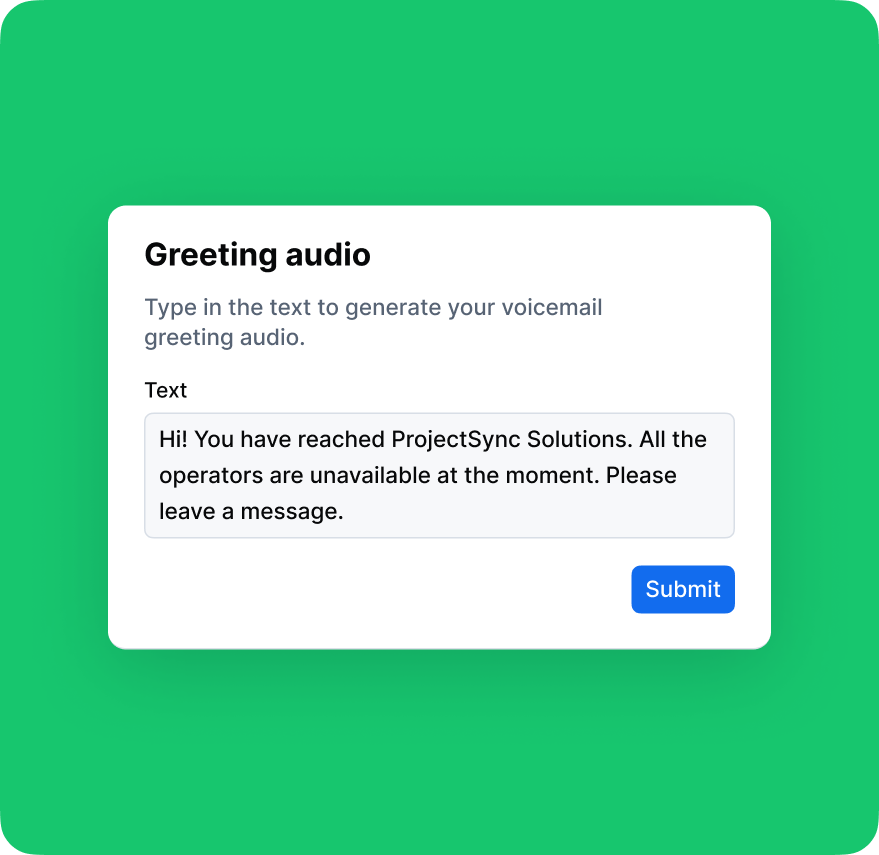Blog
Cloud Phone System
What Is Call Recording Compliance?

What Is Call Recording Compliance?
Explore the basics of call recording compliance, including legal requirements and best practices for obtaining consent from all parties involved.
Call recording is a common practice for businesses, especially in areas like call centers, technical support, and sales. By recording and analyzing phone calls, these teams can capture valuable customer data. This data can help enhance customer service, resolve disputes more effectively, and more.
However, it’s vital to ensure that all recordings comply with the local laws of each party involved. Missteps can lead to significant legal and financial penalties. Compliance can be a real challenge, though, since laws governing call recording vary by country and, in some cases, by state or region.
This article provides an overview of key compliance considerations for call recording, including legal requirements, country-specific regulations, and essential best practices.
Disclaimer: This article is for informational purposes only and should not be considered legal advice or an exhaustive summary of call recording regulations. It provides background information to help you understand call recording laws and their potential relevance to your organization. Consult a qualified attorney or legal expert if you need assistance in interpreting this information or ensuring compliance.
Call Recording Compliance: Understanding Consent
Before we can dive into call recording laws, it’s important to understand a core legal concept: consent. One aspect of consent concerns how many call participants must consent to a call being recorded:
- One-party consent. In jurisdictions with one-party consent laws, only one person on the call needs to be aware of and consent to the recording. If you are a participant in a conversation, you can record it without informing the other party.
- All-party consent (often misleadingly called two-party consent). In jurisdictions with all-party consent laws, every participant in a call must explicitly agree to call recording before it begins.
The other key element of consent involves how people express it. Consent can be either explicit or implicit:
- Explicit consent. You ask for permission to record the call and receive clear verbal or written agreement from each participant.
- Implicit consent. You inform callers that you will record the call. If they continue on the line, their consent is implied.
If you don’t get consent when it’s required, lawsuits or fines can follow.

Call Recording Laws in the United States
Federal Laws
In the U.S., federal law dictates one-party consent. However, you cannot record a conversation unless you are actively participating in it. Doing so counts as illegal eavesdropping or wiretapping under the Federal Wiretap Act (18 U.S.C. § 2511).
In addition, businesses that record customer calls must also follow Federal Trade Commission (FTC) and Federal Communications Commission (FCC) guidelines. This means ensuring clear notification and consent.
State Laws
Individual state laws differ regarding consent requirements for call recording. Most states allow call recording as long as one participant consents. However, the following states require consent from all participants before recording:
- California
- Connecticut
- Delaware
- Florida
- Illinois
- Maryland
- Massachusetts
- Michigan
- Montana
- Nevada
- New Hampshire
- Pennsylvania
- Vermont
- Washington
In addition, some states impose further restrictions on call recording. Examples include:
- Notification of call recording. In California and Pennsylvania, not only must all parties consent to the recording. But they must also be explicitly notified at the beginning of the call that recording is taking place.
- Recording device restrictions. Florida mandates that recording equipment is not hidden from call participants.
- Disclosure for marketing calls Nevada and Massachusetts require businesses to disclose when calls are being recorded for marketing or sales purposes.
Call Recording Laws in Canada
In Canada, the legality of call recording is governed primarily by the Criminal Code of Canada and the Personal Information Protection and Electronic Documents Act (PIPEDA).
Canada generally requires only one-party consent for call recording. However, PIPEDA sets stricter rules when personal information is involved. If a business records a call for customer service, marketing, or other commercial purposes, it must inform the other person and get their informed consent.
Individual provinces may have regulations that impose additional mandates, such as stricter consent requirements for commercial call recordings.
To learn more about Canada’s approach to call recording, refer to the Privacy Commissioner's Guidelines for Recording Customer Calls.
Call Recording Laws in the European Union
The General Data Protection Regulation (GDPR) imposes strict requirements for call recording, including:
- Gaining explicit, informed, and unambiguous consent from all participants before recording a call.
- Recording calls only when necessary for a specific business purpose. For example, fraud prevention or compliance with legal or contractual obligations.
- Balancing a legitimate business interest in recording against the individual's privacy rights.
- Providing individuals with access to their data upon request.
- Ensuring secure storage and handling of call recordings.
- Never retain recordings longer than necessary for the specified purpose.
Non-compliance can potentially lead to steep fines — up to €20 million or 4% of global annual revenue.
Best Practices to Ensure Call Recording Compliance
Organizations today often have remote teams and customers in many parts of the world. So it can be challenging to ensure you meet all applicable call recording requirements. Indeed, courts have issued conflicting rulings about matters such as which state’s laws apply when parties from multiple states are on a call.
Rather than trying to navigate specific national and local regulations, a more practical approach is for organizations to establish a call recording policy for all inbound and outbound calls that enforces robust standards. Below are some best practices that can help ensure that your policy achieves call recording compliance.
Inform Call Participants and Get Their Consent
Before recording always notify all call participants that the call will be recorded and get their consent. Have your representative verbally notify other participants at the beginning of the call. And then ask for their explicit consent to record. However, this manual approach is not scalable for call centers, customer support, and sales teams who manage thousands of calls daily.
Accordingly, many businesses use pre-recorded call greetings to automate verbal notifications and gain implicit consent. For example, callers might be greeted with a message like this: “This call may be recorded for quality assurance purposes. By continuing, you consent to the recording.”
If you use recorded greetings, make sure to test your phone system regularly to confirm they play correctly.
With the DialLink cloud-based phone system, it’s easy to create custom greetings like this for both inbound and outbound calls. In fact, DialLink’s AI-powered text-to-speech technology even enables you to create notifications in multiple languages. You don’t need to spend time or money hiring professional voice artists.

Manage and Store Recordings Securely
You also need to protect recorded data from unauthorized access and control how long you keep it. A robust approach should include the following measures:
- Use encryption to safeguard recordings both in transit and at rest.
- Strictly limit who can retrieve and manage the files.
- Store recordings only for as long as permitted.
- When data is no longer needed, delete it securely.
With DialLink, you keep your call recordings in encrypted storage to ensure data security. Additionally, you can manage access to the data using role-based access control (RBAC). It makes it easier to ensure that only appropriate personnel can access sensitive recordings.
Develop a Call Recording Policy and Train Employees to Follow It
Create clear, consistent guidelines for when and how your team should record calls. The policy should define the approved reasons for recording, specify who can access the recordings, state how long you will store them, and explain how you will delete them properly.
Make the policy easy for all employees to access. Train everyone regularly to reinforce best practices and to explain the serious consequences of illegal call recordings.
Monitor Call Recordings to Ensure Compliance
Regularly reviewing call recording is essential to ensuring that all employees are following established policies. For example, if customer service representatives are required to obtain verbal consent before recording, managers should ensure compliance by conducting quality checks.
However, verifying compliance by checking recordings can be challenging. After all, consent must be granted before the rep is permitted to press the “Record” button. DialLink enables managers to use the group calling feature to connect to live calls and listen in real time to confirm that consent scripts are properly followed.
Stay Current on Changing Compliance Requirements
Call recording laws change over time, so organizations need to stay updated on relevant legal developments. Watch for new and revised requirements for recording practices at the regional, national, state, and local levels.
Regularly review and update your call recording policy, especially when entering new markets or adapting to new regulations. Consult legal experts to ensure continued compliance with current regulations.
How DialLink Helps Organizations Achieve Call Recording Compliance
Call recording is an extremely valuable tool for businesses, but it comes with serious legal responsibilities. Businesses must understand and adhere to applicable laws, industry regulations, and best practices. All these helps minimize legal risks and maintain customer trust. By implementing robust compliance measures, businesses can ensure they use call recordings both legally and ethically.
The DialLink business phone system makes it easier for you to implement many of the core best practices recommended for call recording compliance. With capabilities like custom greetings, group calling, role-based access control, and encrypted storage, you can responsibly take advantage of the many business benefits of call recording.
Featured Tags
Share

Arina Khoziainova
Content Writer at DialLink
Arina is a content writer with over 7 years of experience in the IT industry. At DialLink, she creates clear, insightful content that helps small business and startup owners simplify communication and drive growth using modern tools. With a strong focus on practical value, Arina transforms complex topics into accessible, actionable stories.
Keep Reading

What Is Call Monitoring and Why Is It Important?
Learn what call monitoring is, how it works, and how call monitoring tools improve service quality and agent performance.

What is an Outbound Call Center? Everything SMBs and Startups Need to Know
Learn what an outbound call center is, why it’s important for businesses, and how outbound call center services and software help them operate efficiently.

What Is PBX? A Complete Guide to PBX Phone Systems
Discover what PBX is, how it has evolved from traditional systems to cloud solutions, and how it is now part of broader cloud-based business tools.

What Is a Virtual Phone Number and How to Get One for Your Business?
Learn what virtual phone numbers are, how they work, the types available, and how to get one for your business with DialLink.

What Is a Call Log and Why Is It Essential for Small Businesses and Startups?
Learn what a call log is, the insights it provides to businesses, and how call log apps and software help you review call log history.

What Is a Hunt Group and How Do Small Businesses Use It for Smart Call Routing?
Learn what a hunt group is, how it works, how it differs from other call routing features, and how to set one up to reduce missed calls and improve response times.

What Is A2P Messaging? A Complete Guide for SMBs and Startups
Discover what A2P messaging is, how it differs from P2P, how small businesses use it daily, and what you have to do before sending your first A2P text messaging.

What is an Inbound Call Center? A Complete Guide for Small Businesses and Startups
Learn what an inbound call center is, how it differs from outbound call centers, and when outsourcing might be the right choice for your small business.